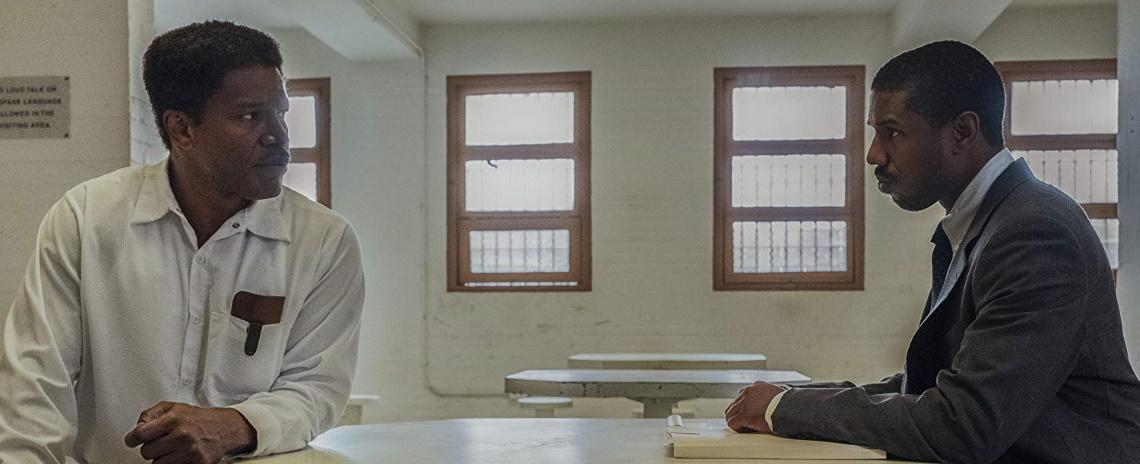Director Dustin Daniel Crettin’s new true-crime saga, Just Mercy, arrives on the tail end of a tsunami of similar stories that have proliferated through the pop-cultural landscape ever since NPR reporter Sarah Koenig first crooned about the case against Adnan Syed on her podcast Serial in 2014. To be fair, tales of violence and injustice have been told since humankind started scrawling their narratives on cave walls, but Koenig’s twisty reportage/soap opera seems to have ushered in a ubiquitous public fascination in these stories, resulting in countless Serial-lite podcasts, sprawling Netflix docu-series, and based-on-a-true-story narrative features.
That wave has likely already crested, but Just Mercy was never likely to make a great impact, regardless of its release date. Crettin’s film is staid and heavy-handed: a volley toward year-end awards consideration with virtually nothing new to say about the criminal-justice system, the powerful who perpetuate its miscarriages to maintain or gain power, and the powerless – predominantly people of color – who suffer because of biased impulses and actions.
As with another 2019 death-row drama – Ed Zwick’s uproariously misguided Trial by Fire – the story here is one worth telling, but the filmmaker’s disinterest in finding new and exciting (or even overhauled tried-and-true) ways to tell it is unmistakable. Black working-class Alabamian Walter McMillian (Jamie Foxx) is sent to death row in 1987, pre-trial, having been accused of killing a white woman whom he’d never met. He’s eventually found guilty and sentenced to death based solely on the shaky testimony of a lowly white convict, Ralph Myers (Tim Blake Nelson).
In 1990, Bryan Stevenson (Michael B. Jordan), a recent Harvard Law graduate, arrives in Montgomery, Ala., to direct the Equal Justice Initiative, an organization providing legal services to inmates in the area. McMillian’s case and the state’s undeniably questionable prosecution of the defendant come to Stevenson’s attention, setting him on a journey to proving the inmate’s innocence and overturning his conviction by dismantling the state’s case. After a series of appeals that result in one state judge granting McMillian a new trial, the prosecutors (spoiler alert for a nearly 30-year-old case) eventually join Stevenson in requesting that all charges against McMillian be dismissed, granting the man his freedom after six years on death row.
This narrative is unfortunately all too familiar. At a higher level, Ava DuVernay’s vital 2016 documentary, 13th, traced the line between the amendment to abolish slavery and a present-day U.S. criminal-justice system that is supremely imbalanced toward unjustly punishing people of color. Just Mercy resembles the saga recounted in the second season of the podcast In the Dark, hosted and produced by Madeleine Baran, at least in the sense that both pit a Southern white prosecutor with an ax to grind against a clearly wrongfully accused black man (D.A. Doug Evans and Curtis Flowers, respectively, in the case of In the Dark). Comparing a narrative feature film and a journalistic audio program may seem unfair, but, over the course of several hours, In the Dark manages to extract compelling and granular detail that justifies its length and medium. Meanwhile, Just Mercy whizzes past nuanced dissection in favor of pat grand-standing. The movie-of-the-week patina present here – albeit a handsome one – also carries over to the film’s structure: The narrative is compressed to a point that makes McMillian’s case seem easily distillable into a few paragraphs (as above).
There are grace notes, however, that elevate Crettin’s saga above something like Ed Zwick’s aforementioned dud. Foxx, who’s received modest awards attention as the central prisoner, carries himself with righteous dignity and bottled anguish. Although the film sometimes tips toward the maudlin, Crettin and co-writer Andrew Lanham include scenes inside Alabama’s death row with McMillian as a part of the group of men facing the electric chair, brought together by not only proximity but also their assigned fates. They’re men forced to periodically hear one another’s death – and smell them, too, according to a plot point about the state’s manipulation of Myers to coerce false testimony. Here, along with the black members of the Monroeville community who rally around the inmate’s family and Stevenson, Just Mercy excels at depicting how injustice can galvanize the oppressed.
Foxx may be the only one who elevates the now Oscar-nominated screenplay, adapted from Stevenson’s book of the same name, while others attempt to either enliven the rote proceedings or remain faithful to its dull-as-dishwater nature. In the former camp is Nelson, who’s somewhere between his slack-jawed yokel from O Brother, Where Art Thou? (2000) and his more recent, earnest turn in The Report (2019). In the latter is Brie Larson as Stevenson’s right-hand, Eva Ensley. Unfortunately, the character and the actor barely register, with her wonky wig and Southern accent doing most of the work.
Jordan, one of the most promising young performers working now, is credible outside of the courtroom as the determined upstart, while his skills at performing lawyerly duties there are anything but: His quiet and reserved demeanor as he spouts platitudes about the “State of Things” reverberates with an odd dissonance. Although the lawyer’s relative inexperience could make for an interesting justification for this particular choice, nothing elsewhere supports this reasoning. It’s just another potential differentiator that’s left on the table in the forgettably familiar and mundane Just Mercy.
Rating: C


